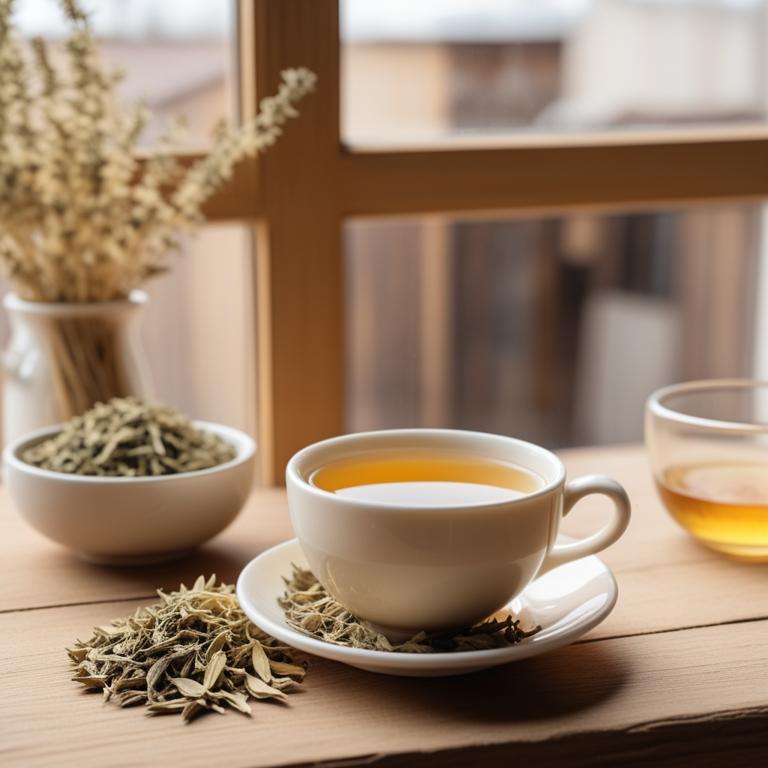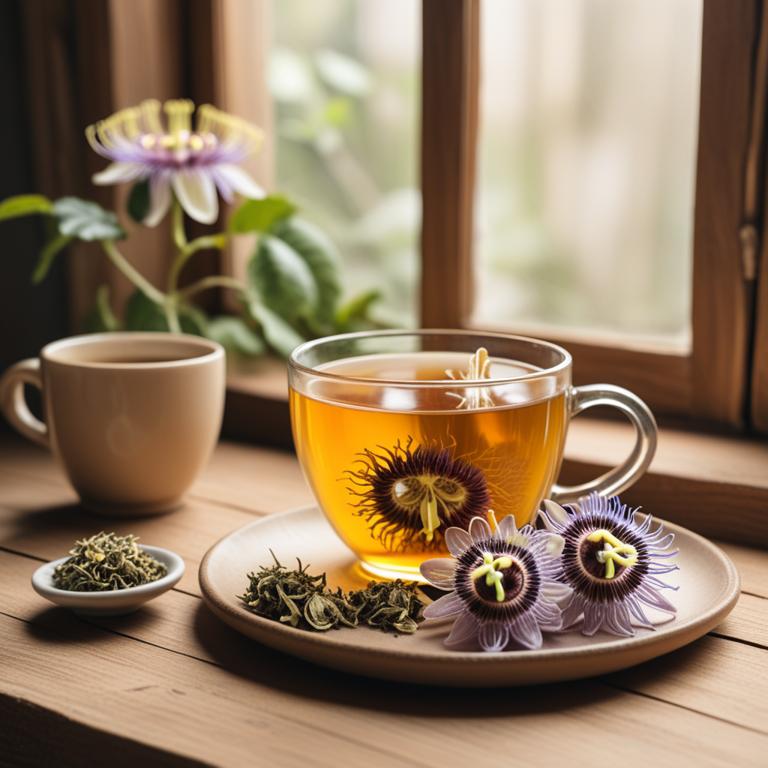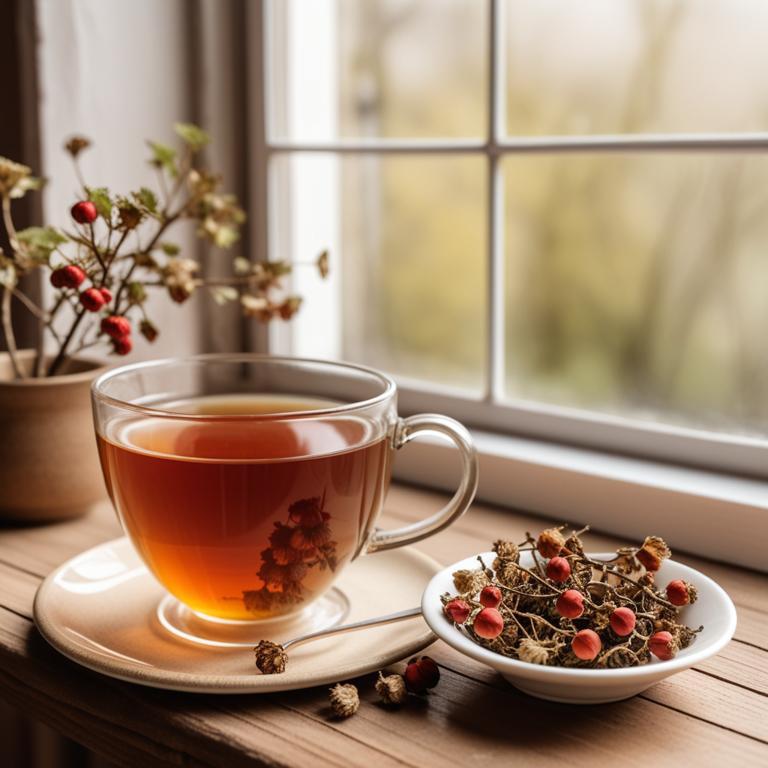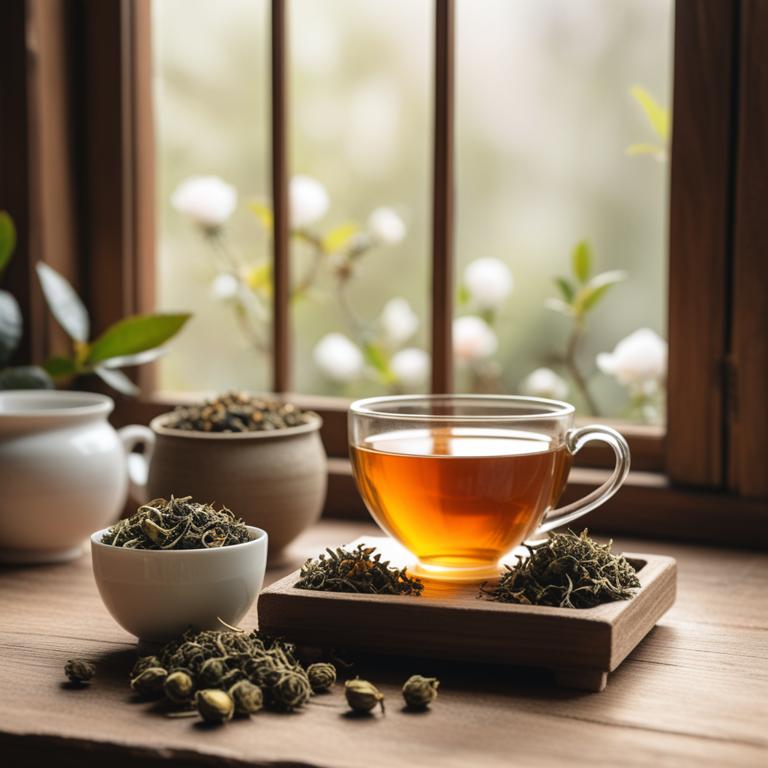10 Herbal Teas For High Blood Pressure

Herbal teas can be a helpful addition to your diet if you're managing high blood pressure.
This is because many herbs have natural properties that help relax blood vessels, making it easier for blood to flow and reducing the pressure inside them. Ginkgo biloba, for example, is known for its ability to improve blood flow and lower blood pressure by preventing the formation of blood clots. It also has antioxidants that protect against cell damage. Another herb that's commonly used to calm high blood pressure is Valeriana officinalis. It contains valerenic acid, which helps slow down the heart rate and promote relaxation. This can help reduce anxiety and stress, which are common triggers for high blood pressure.
Valeriana officinalis also has a sedative effect, making it easier to fall asleep and stay asleep. Passiflora incarnata is another herb that's been used for centuries to treat anxiety and high blood pressure. It contains flavonoids and alkaloids that have a calming effect on the nervous system, making it easier to relax and reduce stress. Passiflora incarnata also has a diuretic effect, which helps remove excess fluid from the body and reduce blood pressure. Drinking herbal teas can bring several benefits to your life if you're managing high blood pressure. For one, they can help you relax and reduce stress, which can be a major contributor to high blood pressure. They can also help you sleep better, which is essential for overall health.
Additionally, herbal teas are a natural and non-invasive way to manage high blood pressure, making them a great alternative to medication.
- 1. Ginkgo biloba
- 2. Valeriana officinalis
- 3. Passiflora incarnata
- 4. Lavandula angustifolia
- 5. Crataegus monogyna
- 6. Glycyrrhiza glabra
- 7. Panax ginseng
- 8. Zingiber officinale
- 9. Camellia sinensis
- 10. Astragalus membranaceus
1. Ginkgo biloba

Ginkgo biloba teas contains bioactive constituents such as flavonoids and terpenoids, which have been shown to have a positive effect on blood pressure.
The flavonoids present in ginkgo biloba, including quercetin and kaempferol, have been found to have vasodilatory properties, meaning they help to widen blood vessels. This widening of blood vessels allows for easier blood flow, which can help to lower blood pressure. The terpenoids in ginkgo biloba, including ginkgolides and bilobalide, have been shown to inhibit platelet aggregation, which can contribute to high blood pressure by causing blood vessels to constrict.
By inhibiting platelet aggregation and promoting vasodilation, ginkgo biloba teas may help to regulate blood pressure in individuals with hypertension.
- Gather 1 cup of boiling water and 1 teaspoon of dried Ginkgo biloba leaves.
- Measure 1 cup of boiling water into a teapot or cup.
- Add 1 teaspoon of dried Ginkgo biloba leaves to the boiling water.
- Let the mixture steep for 5-7 minutes, then strain the tea into another cup.
- Drink 1 cup of the Ginkgo biloba tea 2-3 times a day to help manage high blood pressure.
2. Valeriana officinalis

Valeriana officinalis teas contains valerenic acid, isovaleric acid, and valepotriates as its main bioactive constituents.
These compounds have a sedative effect on the nervous system, which can help reduce stress and anxiety, two common causes of high blood pressure. The valepotriates also have a vasodilatory effect, which means they can widen blood vessels and improve blood flow, helping to lower blood pressure. Additionally, the valerenic acid has a potassium-sparing effect, which helps to regulate the balance of fluids in the body and reduce blood pressure.
By reducing stress, improving blood flow, and regulating fluid balance, Valeriana officinalis teas can help alleviate high blood pressure.
- Gather 1 cup of boiling water, 1 tablespoon of dried Valeriana officinalis root, and a tea strainer or infuser.
- Measure 1 tablespoon of dried Valeriana officinalis root and place it in the tea strainer or infuser.
- Pour 1 cup of boiling water over the Valeriana officinalis root in the tea strainer or infuser.
- Steep the Valeriana officinalis root in the boiling water for 5-7 minutes, then remove the strainer or infuser.
- Strain the tea into a cup and drink it 2-3 times a day, 1 hour before meals, to help manage high blood pressure.
3. Passiflora incarnata

Passiflora incarnata teas contains a variety of bioactive constituents, including flavonoids, alkaloids, and glycosides.
These compounds have been found to have a relaxing effect on blood vessels, causing them to dilate and lower blood pressure. The flavonoids present in Passiflora incarnata teas, such as kaempferol and quercetin, have antioxidant properties that help to reduce inflammation and oxidative stress, both of which can contribute to high blood pressure. The alkaloids, including harmine and harmaline, have been shown to have a sedative effect, which can help to reduce stress and anxiety levels, both of which can exacerbate high blood pressure.
By combining these effects, Passiflora incarnata teas may be a useful natural remedy for individuals with high blood pressure.
- Gather 1 cup of fresh Passiflora incarnata leaves or 2 tablespoons of dried leaves.
- Heat 1 cup of water in a pot and bring to a boil.
- Add the Passiflora incarnata leaves to the boiling water and reduce heat to a simmer.
- Steep for 5-7 minutes, then strain the mixture into a separate cup using a strainer or cheesecloth.
- Drink the tea 1-2 times a day, after consulting with a doctor or healthcare professional, as it may help lower high blood pressure.
4. Lavandula angustifolia

Lavandula angustifolia teas contains the bioactive constituents linalool and linalyl acetate.
These constituents have vasodilatory properties, which help to relax and widen blood vessels, reducing blood pressure. The linalool also has anti-inflammatory properties, which can help to reduce inflammation in the blood vessels and promote healthy blood flow. Additionally, the tea's flavonoids and phenolic acids may help to improve blood vessel function and reduce oxidative stress, further contributing to lower blood pressure.
By promoting healthy blood vessel function and reducing inflammation, Lavandula angustifolia teas may be a useful addition to a treatment plan for high blood pressure.
- Gather 1 cup of dried Lavandula angustifolia flowers and a tea infuser.
- Heat 1 cup of water in a pot and bring it to a boil.
- Reduce heat to low and add the dried flowers to the tea infuser.
- Steep the flowers in the hot water for 5-7 minutes, then remove the infuser.
- Strain the tea into a cup and drink 1 cup, 2-3 times a day, after consulting a doctor.
5. Crataegus monogyna

Crataegus monogyna teas contains flavonoids and phenolic acids, particularly epicatechin, quercetin, and kaempferol.
These bioactive constituents have antioxidant and anti-inflammatory properties that help reduce blood pressure by improving blood vessel function and reducing vascular resistance. The flavonoids in Crataegus monogyna teas also have a dilating effect on blood vessels, which allows blood to flow more easily and reduces the pressure on blood vessel walls. Additionally, the tea's flavonoids have been shown to inhibit the enzyme ACE, which is involved in the production of a potent vasoconstrictor that raises blood pressure.
By reducing the activity of this enzyme, Crataegus monogyna teas helps to lower blood pressure and improve cardiovascular health.
- Gather 1 cup of dried Crataegus monogyna leaves or 2 cups of fresh leaves.
- Boil 1 cup of water in a pot.
- Add 1-2 teaspoons of dried leaves or 4-8 teaspoons of fresh leaves to the boiling water.
- Steep for 5-10 minutes, then strain the liquid into a separate cup.
- Drink 1 cup of the tea 2-3 times a day, preferably before meals, to help manage high blood pressure.
6. Glycyrrhiza glabra

Glycyrrhiza glabra teas contains bioactive constituents like glycyrrhizin, flavonoids, and saponins, which help to manage high blood pressure.
Glycyrrhizin reduces the activity of the enzyme 11-beta-hydroxysteroid dehydrogenase type 2, which is involved in the production of aldosterone, a hormone that can increase blood pressure. Flavonoids, particularly quercetin and kaempferol, have antioxidant and anti-inflammatory properties that help to relax blood vessels and improve blood flow. Saponins, such as glabridin, have a diuretic effect that helps to reduce fluid retention and lower blood pressure.
These properties work together to help regulate blood pressure and promote cardiovascular health.
- Gather 1 cup of fresh or dried Glycyrrhiza glabra roots. Chop them into small pieces.
- Steep 2 tablespoons of the chopped roots in 1 cup of boiling water for 5-7 minutes.
- Strain the liquid into a cup using a fine-mesh sieve or cheesecloth.
- Add honey or lemon to taste, if desired. The recommended daily intake is 1 cup.
- Drink the tea 1-2 times a day, ideally in the morning and before bedtime, for optimal benefits.
7. Panax ginseng

Panax ginseng teas contains bioactive constituents like ginsenosides and ginsenolic acids.
These compounds help relax blood vessels and improve blood flow, which can lower blood pressure. Ginsenosides, specifically, have been shown to inhibit the activity of angiotensin-converting enzyme, a key player in blood pressure regulation. Additionally, Panax ginseng teas have antioxidant and anti-inflammatory properties, which can help reduce oxidative stress and inflammation in blood vessels, further contributing to blood pressure reduction.
By improving blood vessel function and reducing inflammation, Panax ginseng teas may be beneficial for individuals with high blood pressure.
- Gather 1 tablespoon of dried Panax ginseng root and 1 cup of water.
- Add the ginseng root to a small saucepan and pour in the water.
- Heat the mixture over low heat for 10-15 minutes, or until the water is warm.
- Strain the mixture into a cup using a tea strainer or cheesecloth.
- Drink the ginseng tea slowly and enjoy. You can add honey to taste.
8. Zingiber officinale

Zingiber officinale teas contains gingerols and shogaols, bioactive constituents that help lower blood pressure.
Gingerols and shogaols have antioxidant and anti-inflammatory properties that reduce the formation of angiotensin-converting enzyme (ACE), a key player in blood pressure regulation. They also relax blood vessels and improve blood flow, making it easier for blood to circulate and reducing the pressure on blood vessel walls. Additionally, gingerols and shogaols have a direct effect on the cardiovascular system by reducing the production of prostaglandins, hormone-like substances that constrict blood vessels.
Regular consumption of Zingiber officinale teas may help reduce systolic and diastolic blood pressure in people with hypertension.
- Gather 1 teaspoon of dried ginger root (Zingiber officinale) and a cup of boiling water.
- Place the ginger root in a tea infuser or a small saucepan.
- Pour 1 cup of boiling water over the ginger root.
- Let it steep for 5-7 minutes, then strain the tea into a cup.
- Drink the tea 2-3 times a day to help manage high blood pressure.
Zingiber Officinale Tea on Amazon
FGO Organic Ginger Tea, 100 Count, Eco-Conscious Tea Bags, Caffeine Free, Packaging May Vary (Pack of 1)
Disclaimer: We earn a commission if you click this link and make a purchase at no additional cost to you.
9. Camellia sinensis

Camellia sinensis teas contains flavonoids, such as quercetin and kaempferol, which have been shown to help lower blood pressure by improving blood vessel function.
The tea also contains catechins, specifically epigallocatechin gallate (EGCG), that can help relax blood vessels and reduce blood pressure. The L-theanine content in Camellia sinensis teas has a calming effect on the nervous system, which can also contribute to a decrease in blood pressure. The potassium content in the tea helps to balance sodium levels in the body, promoting a healthy blood pressure.
Regular consumption of Camellia sinensis teas has been associated with improved cardiovascular health, including reduced blood pressure in individuals with hypertension.
- Gather 1 cup of Camellia sinensis leaves (black, green, or oolong tea) and 1 cup of boiling water.
- Measure 1 tablespoon of loose-leaf tea or 1 tea bag and place it in a cup.
- Pour boiling water over the tea leaves or tea bag and let it steep for 3-5 minutes.
- Strain the tea into another cup and discard the tea leaves or tea bag.
- Drink 1 cup of the tea 2-3 times a day to help lower blood pressure, but consult a doctor before making any changes.
10. Astragalus membranaceus

Astragalus membranaceus teas contains bioactive constituents like isoflavones, flavonoids, and saponins.
These compounds have anti-inflammatory properties that help reduce inflammation in blood vessels, which can contribute to high blood pressure. The flavonoids in Astragalus membranaceus teas also have vasodilatory effects, which means they help widen blood vessels and improve blood flow. This can lower blood pressure by reducing the resistance in blood vessels and allowing blood to flow more easily.
By reducing inflammation and improving blood flow, Astragalus membranaceus teas may help manage high blood pressure.
- Gather 1 cup of water and 2 tablespoons of dried Astragalus membranaceus root.
- Heat the water in a pot until it boils.
- Reduce heat and add the dried Astragalus membranaceus root to the water.
- Let the mixture steep for 5-7 minutes, then strain the liquid.
- Drink 1/2 to 1 cup of the tea 2-3 times a day to help manage high blood pressure.